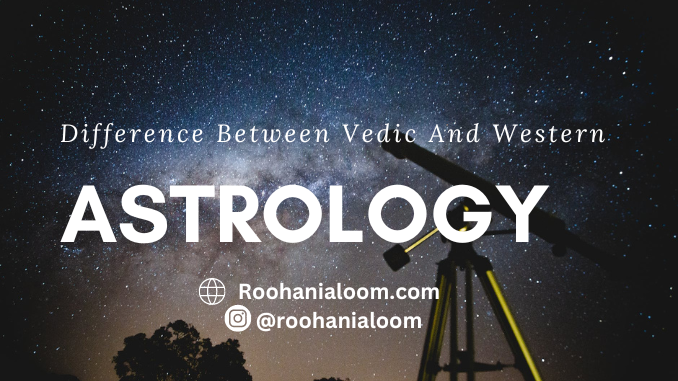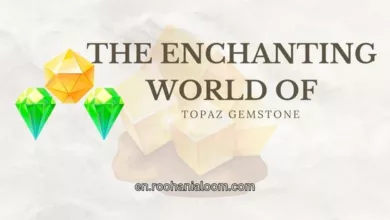Vedic and Western Astrology | Uncovering the Hidden Gems

A Comparison of Vedic and Western Astrology: What’s the Difference?
We will explore the differences between the two effective forms of astrology: Vedic and Western. Astrology has been around for thousands of years and has been used to help people make sense of the world around them. There are many different forms of astrology, but Vedic and Western astrology are the most popular. I’ll explain each type of astrology, compare and contrast them, and discuss their relative strengths and weaknesses. So, let’s dive in and learn more about the differences between Vedic and Western astrology!
Introduction to Vedic and Western Astrology
Vedic Astrology, also known as Jyotish, is an ancient system of astrology that originated in India over 5,000 years ago. It is based on a set of principles that are different from those used in Western astrology. Vedic Astrology uses a sidereal zodiac and considers the Moon as the most important planet in a chart. The main principles of Vedic Astrology include the use of Nakshatras (lunar mansions), yogas (planetary combinations), and dashas (planetary periods).
Western astrology is a system that originated in Europe and the Middle East and has been practiced for over 2,000 years. Western astrology is based on the tropical zodiac and considers the Sun as the most important planet in a chart. Western astrology’s main principles include using aspects (planetary angles) and transits (planetary movements).
Comparison of Vedic and Western Astrology
Although Vedic and Western astrology have some similarities, there are also some crucial differences between the two systems. For example, Vedic astrology uses a sidereal zodiac, while Western astrology uses a tropical zodiac. This means that each sign of the zodiac is located in a slightly different place in the sky, resulting in different interpretations of the same chart. Additionally, Vedic astrology uses the Moon as the most important planet, while Western astrology uses the Sun. This affects the way in which a chart is interpreted, as the Moon and the Sun have different energies and qualities.
The importance of understanding the differences between Vedic and Western Astrology
It is important to understand the differences between Vedic and Western astrology in order to accurately interpret your chart. Each system has its own unique set of principles and understanding both systems can help you gain a deeper insight into your life and the cycles you experience. By understanding the different interpretations of the same chart, you can gain a more holistic understanding of yourself and the energies around you.
The Major Differences between Vedic and Western Astrology
Vedic and Western astrology are two distinct systems of astrology with different sets of principles, definitions, and techniques. While both systems seek to understand the influence of the planets on human behavior, they each take a unique approach to analyzing and interpreting the stars.
The most significant difference between Vedic and Western astrology lies in the zodiacs they use. Western astrology uses the Tropical zodiac, which is based on the position of the sun relative to the vernal equinox. Vedic astrology uses the Sidereal zodiac, which is based on the position of the stars in relation to the Earth. This means that the same celestial event can result in different astrological interpretations depending on which system is applied.
The planets are also given different roles and significance in Vedic and Western astrology. In Western astrology, the planets are assigned archetypal roles and are interpreted in terms of their relationships with each other. In Vedic astrology, the planets are seen as having both a positive and a negative influence, and their position in relation to the zodiac sign is given more emphasis.
Despite their differences, Vedic and Western astrology can be used together to gain a more holistic understanding of the universe. The two systems complement each other, and can be used together to gain insight into how the planets affect our lives. By combining the two systems, we can gain a more complete picture of the influence of the stars on our lives.
History and Origins
For centuries, people have turned to astrology to gain insight into their lives and the world around them. Vedic astrology and Western astrology are two distinct forms of astrology, each with its own history, philosophy, and approach to divination.
Vedic astrology, also known as Jyotish, is the astrology of the ancient Vedic culture of India. It is based on the Vedas, which are the oldest known Indian scriptures. Vedic astrology is traditionally used to understand karma and life purpose and make predictions about the future.
Western astrology, also known as Hellenistic astrology, originated in Greece and is based on the teachings of the ancient Greek philosopher Ptolemy. It is focused on helping individuals understand their character traits and life path. Western astrology is used for both predictive and psychological purposes and is often used to make decisions about relationships, careers, and health.
The two forms of astrology differ in terms of their zodiacs. Vedic astrology uses a sidereal zodiac, which is based on fixed stars, while Western astrology uses a tropical zodiac, which is based on the seasons. This means that the zodiac signs in Vedic astrology differ from those in Western astrology.
Vedic and Western astrology also differ in terms of their focus. Vedic astrology is focused on helping individuals understand their karma and life purpose, while Western astrology is focused on helping individuals understand their character traits and life path.
Ultimately, both Vedic and Western astrology can provide valuable insight into an individual’s life. Whether you consult a Vedic or Western astrologer, you can expect to gain greater insight into your life and the world around you.
Comparison
Astrology is an ancient practice that has been used for centuries to gain insight into human life and the larger universe. Vedic astrology and Western astrology are two distinct systems of astrology that have been developed over time. While both practices involve observing and interpreting planetary movements and positions, there are some important differences between them.
Regarding origin, Vedic astrology has a much longer history than Western astrology. Vedic astrology originated in India more than 5,000 years ago and is based on the Vedas, the oldest scriptures in Hinduism. On the other hand, Western astrology is a more modern system that developed in Europe in the 17th and 18th centuries.
The methodologies used in Vedic and Western astrology are also quite different. Vedic astrology relies heavily on the sidereal zodiac, which is based on fixed stars, while Western astrology uses the tropical zodiac, which is based on the position of the Sun. Vedic astrology also emphasises the nakshatras, or lunar mansions, while Western astrology focuses more on sun signs.
In addition, Vedic astrology is often used to look at one’s past and present life and identify potential patterns, while Western astrology is more focused on predicting the future. This is because Vedic astrology is based on a person’s karma or the sum of their past actions, while Western astrology is based on a person’s free will.
Although there are some critical differences between Vedic and Western astrology, the two systems can be used together to understand the self completely. By combining the insights of both systems, it is possible to better understand the past, present, and future and make more informed decisions.
Implications of Vedic and Western Astrology in Modern Times
Astrology is a fascinating practice that has been used for centuries to gain insight into individuals’ personalities, events, and potentials. It has evolved, and can be divided into two main categories: Vedic astrology and Western astrology. While the two approaches share some similarities, there are also some important differences.
The history of Vedic astrology dates back at least 5,000 years and is believed to have originated in India. It is based on the Vedic scriptures and is sometimes called Jyotish, which means “divine science”. On the other hand, Western astrology is believed to have originated in Babylon and has been practiced since ancient times. It is based on the position of the planets and zodiac signs in relation to one another.
One major difference between Vedic and Western astrology is the planets and zodiac signs they use. Vedic astrology uses 27 constellations, which are known as nakshatras, as well as nine planets. In Western astrology, there are 12 zodiac signs and seven planets, emphasising the Sun and Moon.
The two systems also differ in terms of how they interpret the planets and zodiac signs. Vedic astrology emphasises the nakshatras and uses a system of predictive astrology to make predictions about the future. Western astrology is more focused on the position of the planets and zodiac signs and uses a system of psychological astrology to interpret the personality and potentials of individuals.
Despite their differences, both Vedic and Western astrology can be useful in modern times. Vedic astrology can be used to gain a better understanding of one’s past and present, while Western astrology can be used to explore potentials and gain insight into the future. Additionally, combining the two systems makes it possible to gain a more holistic perspective on life.
Examples of how Vedic and Western astrology have been successfully applied in the modern world include celebrity readings, business advice, and even psychological counseling. For example, Oprah Winfrey has used astrology to help guide her career decisions, and many businesses have used it to inform strategic decisions. Additionally, many psychologists and therapists have found that incorporating astrology into their sessions has been beneficial in helping their clients gain greater insight into their lives.
Ultimately, both Vedic and Western astrology can be useful in modern times. By understanding the differences between the two systems, individuals can gain a deeper understanding of their lives and insights into potentials and opportunities.

